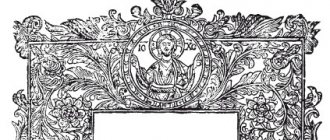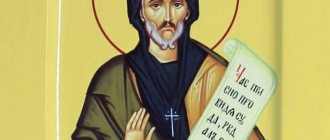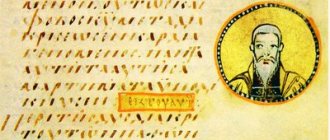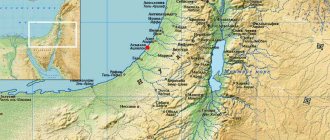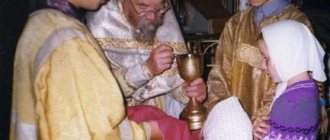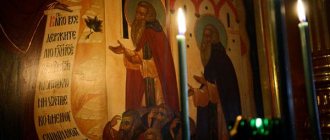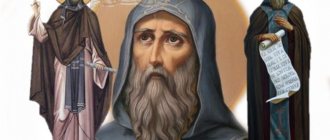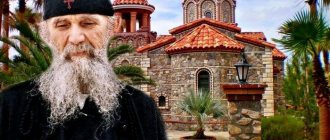Ephraim the Syrian - Doctor of the Church of the 4th century
In the 4th century, the title of Doctor of the Church was awarded to Ephraim the Syrian. Today, only 36 people in the world have this title.
The Monk Ephraim the Syrian is a Christian theologian and poet, hierodeacon. Recognized as one of the Doctors of the Church of the 4th century.
Teacher of the Church
this title is awarded to outstanding theologians
The title of Doctor of the Church is awarded as an honorary title by the Catholic Church to the most outstanding theologians.
It was appropriated for the first time in 1298. Currently there are thirty-six such Teachers. It should be noted that Father Ephraim the Syrian is revered by both Catholics and Orthodox Christians.
Venerable Ephraim the Syrian. Manuel Panselin. Fresco of the Church of the Assumption of the Virgin Mary in Protata. Athos. Beginning of the 14th century This is what the great Christian ascetic, poet and theologian looked like
In addition, all Orthodox Christians know him as an outstanding ascetic and hermit. It was thanks to asceticism that the saint’s prophetic gift was revealed. During his lifetime he was called the prophet of Syria.
Thanks to his gift, according to God's Providence, he became an authoritative interpreter of the Holy Scriptures in the Church. Many theologians referred to his writings, for example, John Chrysostom.
David writes psalms. Khludrovskaya Psalter, Novgorod, late 13th century. King David is the first psalmist in Christianity. Ephraim the Syrian took his example
In the history of the Church, he is famous for the fact that the Psalter, a collection of psalms or prayers, was written based on his sayings.
In Christianity, besides it, the Psalter itself, compiled by King David, and the Psalter of the Mother of God are known. It includes 400 hymns.
Hymns or “madrashis” were sung. They had stanzas. “Memras” did not have stanzas; they represented gomils in poetic form.
In total, approximately 50 different poetic meters are distinguished in the saint’s work.
It was precisely this variety of technical techniques and poetic skill that allowed Ephraim the Syrian to write those psalms that later became the basis of his Psalter.
Department one
Beatitudes
Blessed is he who in the Lord has become completely free from everything earthly in this vain life and has loved the only good and merciful God.
Blessed is he who has become a doer of virtues and, like a fruitful field, bears a great abundance of the fruits of life in the Lord.
Blessed is the one who, standing at God's service in prayer, and every hour, like a heavenly angel, has pure thoughts and does not give access to the evil one, lest he take his soul captive and lead it away from God the Savior.
Blessed is he who loves holiness (purity) as light, and has not desecrated his body before the Lord with the shameful deeds of the evil one.
Blessed is the one who always has in himself the remembrance of God, because such a person on earth is like a heavenly Angel, constantly serving the Lord with fear and love.
Blessed is he who loves repentance, which saves sinners, and does not delight in sin, lest he appear ungrateful before our Savior God.
Blessed is he who, like a courageous warrior guarding the royal treasures, keeps his soul and body blameless in the Lord.
Blessed is he who, like an angel in heaven, has pure thoughts and with his lips sings songs to Him who has power over every breath.
Blessed is he who has become like the seraphim and cherubim and is never lazy for spiritual service, constantly praising the Lord.
Doxology to the Savior
I adore You, Master, I bless You, O Good One, I beg You, Holy One, I fall before You, O Lover of Mankind, and I glorify You, Christ, because You, the Only Begotten, the Lord of all, the only Sinless One, for me, an unworthy sinner, were put to death, and to death godmother to free the sinner's soul from sinful bonds.
And what will I repay You for this, Master? Glory to Thee, Lover of Mankind! Glory to Thee, Merciful One! Glory to Thee, Long-suffering One! Glory to You, Forgiveness of all sins!
Glory to Thee, Who descended to save our souls! Glory to Thee, Incarnated in the womb of the Virgin! Glory to You, Who bore the bonds! Glory to Thee, Thou Who Accepted Scourging! Glory to You,
Devoted to ridicule! Glory to Thee, Crucified One! Glory to Thee, Buried One!
Glory to Thee, Risen One! Glory to Thee, Preached One! Glory to Thee, in whom we have believed! Glory to You, Ascended into Heaven! Glory to You, Who is seated with glory at the right hand of the Father and who comes again with hosts of Angels to judge every soul that has humiliated Your holy sufferings!
In that trembling and terrible hour, when the heavenly powers move, when all the angels, archangels, cherubim and seraphim will stand before Your glory with fear and trembling, when the foundations of the earth will shake and every breath will be horrified by the incomparable majesty of Your glory - in that hour yes Your hand will cover me under Your wings and may my soul be delivered from the terrible fire, and the gnashing of teeth, and pitch darkness, and eternal weeping, so that I too can say, blessing You: “Glory to Him who wanted to save the sinner according to the great bounties of His mercy!”
Grant all-satisfying grace!
Heal me, Lord, and I will be healed! O One Wise and Merciful Physician, I beseech Thy goodness: heal the ulcers of my soul and enlighten the eyes of my mind, so that I may understand Thy constant dispensation for me! And since my heart and mind have become foolish, may Thy grace, this true salt, correct them.
What shall I tell you, O Heart-Knower, who searches hearts and bellies? You Yourself know that, like a waterless land, my soul thirsts for You and my heart longs for You. Your grace has always satisfied the one who loves You.
For this reason, as You always listened to me, so now do not despise my prayer! For my mind, like a captive, seeks You, the only true Savior.
Send Your grace, may it satisfy my hunger and quench my thirst, for I insatiably long for You, my Lord! And who can be satisfied with You if he truly loves You and thirsts for the light of Your truth?
Giver of light! Fulfill my request and grant me, according to my prayer, exude into my heart a single drop of Thy grace, may the flame of Thy love burn in my heart like fire, and, like thorns and thistles, may gulp down evil thoughts!
Grant me this richly, like God to man, give it to me like the King of kings, multiply it like a good Father!
You are everything for us, Lord!
We seek You, Lord, in prayer, because everything is contained in You. Let us be enriched by You, because You are wealth that does not change with the changes of times.
May Your mercy come to our aid! May Your grace protect us! From Your treasure pour out medicine on us to heal our wounds!
We must seek You instead of everything else and not seek anything besides You, for whoever seeks You finds everything in You.
In You is wealth for those in need, heartfelt joy for those who mourn, healing for all the wounded, consolation for all who mourn.
Accept our prayer, our Lord, and grant us Yourself. May we live in You, may we possess You instead of everything else, and then everything will be ours.
Let us, Lord, be Thine! In Your mercy, be You ours, because the Righteous Father gave You to us as a cure for our wounds.
Our You are according to the will of Your Father, our You are also according to Your will. You are with us – Emmanuel! You are with us as our Lord.
Accept our prayers from us, our God who has descended to us, accept the tears of sinners and show mercy to the guilty.
By Your will You united with us, be the Intercessor of our prayer. Raise her to Your Father and establish peace in our souls!
Be everything to us and let us dedicate everything we have to You!
Save me like the apple of my eye, Lord God, protect me and shelter me from temptations under Your wings.
Be the guardian of the eye, so that it does not look like a Tat [1]; be a guardian of the ear, so that it does not listen to untruth.
Be a guardian of your lips so that slander, condemnation, blasphemy and even idle words do not come from them.
Be a guardian of the heart so that it does not deviate into wickedness and commit iniquity.
Grant us, Lord, knowledge (what to do) and impart to us knowledge (the ability to do).
Grant us, our Lord, to be more pleasant to You than incense and aromas.
Grant us, our Lord, to love You and hate the world. Grant to us, our Lord, that instead of passing possessions we may acquire You alone.
Grant us, our Lord, to bring You three chosen gifts. Grant us, our Lord, to burn three fragrant incense before You. Grant to us, our Lord, to light for You three brightly burning lamps: spirit, soul and body, these three gifts to the One Trinity.
We will dedicate the Spirit to the Father, we will dedicate the soul to the Son, we will dedicate the body to the Holy Spirit - the Spirit, who will again raise him from the dust.
Father, sanctify our spirit to You! Son, sanctify our soul to Yourself! Holy Soul, sanctify Yourself our body, exhausted from ulcers!
Grant us, our Lord, to rejoice in You, and You will rejoice in us on the last day! Praise be to You from spirit, soul and body! And for us - Your bounties.
The monk was born into a pious family
The Monk Ephraim the Syrian was born in the city of Nizibia, Mesopotamia, into a family of poor peasants.
This happened around 306. He received the nickname “Sirin”, that is, Syrian, because Mesopotamia in ancient times belonged to Syria.
Life and Dormition of St. Ephraim. Fresco. Ottoman Empire (Greece). XVI century. Greece. Meteors. Monastery of Nicholas Anapafsas. The fresco depicts scenes from the life of St. Ephraim of Syria
His parents were devout Christians. Ephraim himself in his youth was distinguished by a hot-tempered and irritable character.
He did bad things, but one day an incident happened that made him come to his senses.
The young man was accused of stealing sheep and imprisoned. He did not commit theft, but he could not prove it.
At night, in a dream, he heard a voice calling him to repent and renounce his prodigal lifestyle.
Soon after the appearance of the Voice of God in a dream, Ephraim was acquitted and released from prison.
This incident had a great influence on the monk. He decided to lead an ascetic life and become a hermit. For this, the saint withdrew to the surrounding mountains.
Hermitage, as a form of asceticism, was introduced in Nisibia by the Egyptian hermit Eugene. Eugene was a student of Saint Anthony the Great.
Bishop of the Nisbi Church, Saint James became the teacher of Ephraim the Syrian
At that time, the ascetic bishop of the Nizby Church, Saint James, was widely known among hermits. He denounced the Arians and actively preached Christianity.
Ephraim became one of his disciples. During his apprenticeship, the monk earned the reputation of a meek and moderate man, very pious and knowledgeable.
The saint himself considered himself “unlearned and unthinking.”
This characteristic testifies to his modesty, since Ephraim the Syrian knew very well the works of Christian scientists, “Egyptian wisdom,” the principles of natural science and pagan mythology.
First Ecumenical Council. Minea July. Icon. Rus. Beginning of the 17th century Church-Archaeological Cabinet of the Moscow Theological Academy. On his trip to the Council, St. James was accompanied by the Monk Ephraim
Knowing the great merits of his disciple, Saint James entrusted him with preaching and teaching children. In addition, he accompanied him to the First Ecumenical Council.
The council took place in 325 Nicaea. The Monk Ephraim served Jacob until his death for 14 years.
Why is this prayer read during services during the Nativity Fast?
A clergyman’s handbook: “Comparing the Lenten service with the service of the Nativity Fast, it should be noted that according to the Church Charter, on some of its days it is necessary to sing “Alleluia,” that is, the structure of the service on these days exactly corresponds to the Lenten one: the hours, the prayer of Ephraim the Syrian, bows.
In total, according to the Charter, “Alleluia” is supposed to be sung eleven times during the Nativity Fast: November 19, 26 and 29 and December 1, 2, 3, 8, 14, 16, 18 and 19. Divine services on these days, as well as during Lent, are essentially repentant in nature.
During the Nativity Fast there are also a number of solemn services. The alternation of holiday and penitential days is the essential feature of the divine service of the Nativity Fast, distinguishing it from other days of the church year, and especially from Great Lent.”
What do the words mean: “do not give me the spirit of idleness, despondency, covetousness and idle talk”? Is the Lord really the giver of the spirit of sins and passions?
Nowadays, we often hear: if God is holy and omnipotent, why do sinners commit sins; Why is the world filled with lawlessness and evil? Is God not holy enough or omnipotent enough? The above-mentioned words of the prayer of St. Ephraim may cause even greater bewilderment if we take them with rough literalism.
What can you answer to this? God is the most perfect Spirit in Himself (John 4:24), absolute Good, and of course, He never pushes anyone to sin.
Considering this, we, at the same time, must understand that everything that happens in the kingdom of creation, including countless atrocities, is not done without Divine will.
In the will of God, two aspects should be distinguished: favor and permission. The Lord loves good, always favors it, always promotes everything good: thoughts, thoughts, deeds.
As for lawlessness, its God, as absolutely Holy (Lev.20:26), hates evil (Ps.44:8).
Strange as it may seem, the possibility of committing sins is inherent in human nature by the Creator Himself. For what?
If a person did not have this opportunity, he would not be able to consciously and freely decide for good. And without this, he could not become righteous: after all, righteousness is based and formed on a voluntary, but not forcibly imposed, desire for Good.
Testing the freedom of human will, God allows a person to commit evil deeds (to the extent that he considers it appropriate), both through temptation from evil spirits and through arbitrary initiative.
Therefore, when we, following St. Ephraim, ask the Lord “not to give” us the spirit of idleness, despondency, covetousness and idle talk, we ask, in essence, to reduce the measure of that allowance, as a result of which we, as morally free, have the opportunity commit this type of sin.
At the same time, we pray to the Lord of life for gracious assistance in order to be able to resist temptations or, if they arise, to successfully overcome them.
In the same sense, one should understand the well-known petition from the Lord’s Prayer: “and do not lead us into temptation.”
Great Prayer of Lent by Ephraim the Syrian - Interpretation of Luke (Voino-Yasenetsky)
Ephraim the Syrian composed psalms for the Psalter in the monastery of the city of Edessa
In 363, Nisibia was taken and destroyed by the Persians. This event forced the hermit to leave the mountains and settle in a monastery. The monastery was located near the city of Edessa.
The monastery was inhabited by ascetics who, for the sake of saving their souls, retired to caves. In them they only took grass from food. Their life was spent singing psalms and praying.
The monk became closer than all of them to the ascetic Julian. While in the monastery, he not only performed feats, but also taught. He also gave sermons.
They say this about how Ephraim received the gift of preaching. One day, while the monk was on a mountain near Nizibia, he saw that a heavenly angel had descended.
The angel was holding a scroll in his hands. He asked: “Who is worthy to receive this scroll?”
Book miniature. Byzantium. XIII century. Greece. Athonite libraries. Venerable Ephraim of Syria receives the gift of preaching from the Lord
A voice from above answered him: “No one else but Ephraim, My saint.” The ascetic opened his mouth, and the Angel put the scroll in his mouth. The Reverend swallowed it.
Since then, he acquired the gift of preaching, under the influence of which pagans became Christians.
In addition to reading sermons, the saint also interpreted Holy Scripture in the monastery. In his writings, he described the life of the monastery and the ascetics who labored in it.
Thus, the story in the psalms was created. The main thing in it is the common prayer of the monks and joint work for the common benefit.
Great Prayer of Lent
There was a vision to one holy father who labored in the desert. He saw a host of angels descending from heaven and carrying a large scroll covered with writing on both sides. They asked each other: “Who can accept this scroll?” And there was a voice from heaven: “Only Ephraim, My chosen one.”
And they brought Saint Ephraim and gave him this scroll to swallow.
And a wondrous thing happened: like a vine that grew all over the earth, the wondrous words of St. Ephraim spread. Such a wondrous word of the holy Venerable Ephraim the Syrian is the prayer “Lord and Master of my life...”.
Interpretations of the prayer of St. Ephraim the Syrian by the lamps of the Russian land - Archbishop Innocent of Kherson, Archbishop Luka (Voino-Yasenetsky) and Archpriest Valentin Sventsitsky, presented on this disc, help us to think deeply about every word of it and understand the most essential thing that we need to know for our lives and for our salvation.
- Playing time: 3 hours 41 minutes.
Journey to Egypt and retreat to a cave
The monk always grieved over his sins. That is why he went to Egypt in order to see with his own eyes the feats that the great hermits performed here.
Despite universal veneration, Ephraim considered himself lower and worse than his own. Communication with Egyptian hermits brought great consolation to the saint.
He was received in Egypt as a dear guest. That's why he spent a lot of time there.
Caesarea
a city in Turkey visited by Ephraim the Syrian on his way from Egypt
Returning from Egypt, Ephraim the Syrian visited Caesar of Cappadocia. Here he talked with Saint Basil the Great. He expressed a desire to make him a presbyter.
The monk, out of his modesty, refused this and was only ordained a deacon.
Later, Basil the Great invited Ephraim the Syrian to the episcopal see. To avoid this, the ascetic pretended to be a holy fool.
Dormition of St. Ephraim. Book miniature. Minology of Vasily II. Byzantium. 10th century Vatican. Apostolic Library. The Monk Ephraim the Syrian died quietly, in solitude from the world
Returning to Edessa, Ephraim withdrew from the world.
9 June 373
day of death of Ephraim the Syrian
He lived the rest of his life in a cave, occasionally helping the residents of the city.
The monk died on June 9, 373 in solitude.
The Monk Ephraim bequeathed to bury himself among the poor and criminals
Before his death, the Venerable Ephraim the Syrian bequeathed to bury himself in Edessa, in a cemetery for beggars and criminals.
His last wish was not fulfilled, since soon after his death his remains were transferred to the tomb of the Edessa bishops. It is not known where she was.
In the 19th century, J. Badger, an English traveler, visited the Armenian Church of St. Sergius, located west of the city.
In it he discovered the tombs of St. Ephraim the Syrian and St. Theodore.
Later, the relics of the saint were seen in the Armenian monastery of Deir Sarkis. At the end of the 19th century, local Muslims burned it.
The largest monastery of Holy Mount Athos is the Lavra of Athanasius of Athos. A particle of the relics of St. Ephraim the Syrian is kept here
Particles of the relics are kept in various Greek monasteries - the Great Lavra, Dionysiatus, etc. They are also located on Athos.
There is information that the tree of Ephraim the Syrian is preserved in the Deir el-Surian monastery.
According to legend, it grew from the staff that the monk stuck into the ground when he arrived there.
Great Prayer of Lent
Lord and Master of my life, do not give me the spirit of idleness, despondency, covetousness and idle talk. (Bow to the ground)
Grant the spirit of chastity, humility, patience and love to me, Your servant. (Bow to the ground)
Hey, Lord, King, grant me to see my sins and not condemn my brother, for blessed are you forever and ever. Amen. (Bow to the ground)
God, cleanse me, a sinner. ( 12 times , with bows from the waist)
(The prayer is read in full again with one bow to the ground at the end).
- My life is my life;
- Give - give;
- Yes, Lord - Oh, Lord;
- Grant me vision - let me see, realize;
- Yako - because;
- Yes - yes.
The Prayer of Ephraim the Syrian is a prayer of repentance, compiled in the 4th century. by St. Ephraim the Syrian (Syrian), which is read at the services of Great Lent.
During Lent, this prayer is read in church during the Hours on Wednesday and Friday of Cheese Week and throughout Holy Pentecost, except Saturdays and Sundays; also in the first three days of Holy Week. On these same days, it is included in the home prayer rule. On Saturdays and Sundays this prayer is not read.
On Great Wednesday at the end of the liturgy on “Be the name of the Lord...” the prayer of St. Ephraim the Syrian is read for the last time. Special services for Holy Week begin.
During the Nativity Fast, prayer to St. Ephraim the Syrian is read on days when daily worship is performed, which is not marked in the Typikon with a sign. See Typikon. Monthly words: November 14.
Memorial Day of St. Ephraim the Syrian February 10
The Orthodox Church honors the memory of the saint on February 10. They pray to him to curb anger and malice.
Women turn to the saint so that he can reason with pugnacious husbands. They also pray for peace both in the family and home, and in the state.
Book miniature. Russia. XVI century. Russia. Moscow. Russian State Library. In Orthodoxy, the day of St. Ephraim the Syrian is celebrated on February 10
The Monk Ephraim the Syrian is highly revered on Athos. This is due to the fact that the saint was a hermit and lived almost his entire life in caves.
In addition, a part of his relics is kept and prayerfully venerated in the largest monastery of the Holy Mountain - the Lavra of Athanasius of Athos.
Lavra of Athanasius of Athos
The Great Lavra or Lavra of St. Athanasius is the largest and most important Orthodox monastery on Mount Athos.
It is located in the southeastern part of the peninsula, half an hour away from the coast at the very foot of Mount Athos.
The patronal feast of the monastery is the day of memory of St. Athanasius, who founded it, celebrated on July 5 according to the old style.
The Psalter of St. Ephraim the Syrian was compiled by Theophan the Recluse
The Psalter of Ephraim the Syrian was compiled by Theophan the Recluse. This happened in the last century. The monk himself did not compile such a book.
All sayings, prayers and psalms were taken by Theophan from various writings of St. Ephraim. The compilation of the Psalter by Theophan was done for spiritual benefit and prayer.
Photo of St. Theophan the Recluse. The date of the photograph is unknown. Saint Theophan the Recluse - creator of the Psalter of St. Ephraim the Syrian
Prayers for it should be read both in church and at home. The model for the work of Theophan the Recluse was the Psalter of King David.
At the same time, with the Monk Ephraim the Syrian it is filled with exaltations of prayer to God, because he is a man of prayer. Saint David is primarily a Psalmist.
Theophan the Recluse chose the number of psalms contained in the Inspired Psalter as a measure of the number of articles included in the Psalter.
An index of their content is the content of the psalms. In addition to prayers, they contain everyday stories, dogmas and moral teachings.
Psalter 1861 edition. Found in a private collection. In imitation of the Psalter of King David, Theophan the Recluse compiled the Psalter of Ephraim the Syrian
In addition, the Psalter contains texts by St. Athanasius the Great and St. Maximus the Confessor. They are dedicated to the Holy Trinity and the incarnation of God the Word.
The dogmas are taken from the writings of St. Ephraim the Syrian. His stories in prayers consistently outwardly describe the life of a Christian from birth to death. Internally, they talk about the struggle with sin.
Why is this prayer read during services during Lent?
The authorship of the prayer belongs to the great Christian ascetic, St. Ephraim the Syrian.
At one time, Ephraim was called to serve God by a special intervention from above - Supernatural Revelation.
Until this time, he led a rather frivolous, morally free life. One day he was imprisoned on a false charge of complicity in the theft of cattle, which, in reality, were stolen by wild wolves.
Here he was visited by a certain mysterious husband, who testified that although he, Ephraim, was currently being held in a cell undeservedly, there was still the highest justice in this.
The husband advised him to think and refresh his memory, after which the prisoner Ephraim, following the advice, remembered how once, for the sake of reckless fun and youthful prank, he released a cow that belonged to a poor man from the pen. As a result, the cow was overtaken by a predatory beast, which is why the already difficult, sorrowful life of the poor man was filled with additional difficulties and suffering.
Then the culprit was not punished.
Ephraim was then promised by the same husband that justice would prevail in the case for which he was accused, and that is what happened. The true criminal was identified and punished (he turned out to be a shepherd who did not keep track of the flock), and Ephraim was released.
After this incident, he began to look differently at his personal life and at Divine Providence in general, and then, putting aside the bustle of the world, he turned to asceticism.
The theme of deep repentance and gratitude to God for all His mercies was experienced in the saint’s heart throughout his entire life.
The special humble, repentant attitude characteristic of a true follower of Christ is expressed by him in the prayer known by his name.
This prayer, although brief, at the same time succinctly and expressively reflects some of the most important petitions with which believers, aware of their spiritual poverty, striving to overcome passions and vices, need to turn to their Lord, the Giver of life and all blessings (James 1). :17).
It is appropriate to read it during fasting days because during this period a Christian must make special efforts to transform his life. But this is achievable only with the assistance of God (John 15:5). Therefore, we pray to Him for forgiveness, we ask for help in those, in particular, petitions that are outlined in the text of the prayer of St. Ephraim.
Moral teachings form the basis of the Psalter of Ephraim the Syrian
The Psalter of St. Ephraim mainly consists of moralizing psalms. Moreover, this was the decision of Theophan the recluse, who compiled it. In order to diversify the content, he inserted moral teachings into the essay.
The words of St. Ephraim the Syrian are very suitable for prayerful figures of speech.
150
the Psalter of Ephraim the Syrian contains so many articles
In imitation of the Divinely inspired Psalter, the Psalter of our holy father Ephraim contains 150 articles.
They are divided into 20 sections, following the example of the Psalter, divided into 20 kathismas. Each department, in turn, is divided into three parts - glory.
The beginning of each section opens with a dogma, and at the end there is a moral lesson.
Psalter of St. Ephraim the Syrian. Nowadays. It is based on the moral teachings of St. Ephraim
Theophan the Recluse compiled this collection of selected prayers so that each prayer of the saint was special.
For example, speaking of the fact that some believers complain about the repetition of words in prayers, Theophanes pointed out that there is diversity in the saint’s prayers.
If you, for example, are tired of repeating: Lord have mercy, you can say the praise of the Lord, written by St. Ephraim the Syrian.
An example of such a prayer is the following psalm:
“Thanks be to the Father, who sent You, our Savior! For by You we, the guilty, are justified. You took away our sins by Your cross, take away our guilt from us at Your coming.”
Psalm 3 GIVE ALL-SATISFYING GRACE
Heal me, Lord, and I will be healed! - One wise and merciful Physician, I beg Your goodness, heal the ulcers of my soul and enlighten the eyes of my mind, so that I can understand Your constant dispensation for me! “And since my heart and mind have become foolish, may Thy grace, this true salt, correct them.”
What shall I tell you, O Heart-Knower, who searches hearts and bellies? You Yourself know that, like a waterless land, my soul thirsts for You and my heart longs for You. Your grace has always satisfied the one who loves You.
For this reason, as You have always listened to me, so now do not despise my prayer. For my mind, like a captive, seeks You, the One true Savior.
Send Your grace, may it satisfy my hunger and quench my thirst. For I insatiably desire You, my Lord! And who can be satisfied with You if he truly loves You and thirsts for the light of Your truth?!
While singing psalms, a person experiences closeness to God
In Orthodoxy, psalmody has always been encouraged. The fact is that the tradition of singing psalms has been known since the times of the Old Testament.
During their singing, believers experience the greatest closeness to God. That is why the singing of psalms is an integral part of worship.
Video: PSALMTER or Divine Reflections, extracted from the works of our Holy Father EPHREM THE SIRIAN and arranged in the order of the Psalms of David. Reading and singing psalms brings a person closer to God.
In ancient times, some of the psalms were sung on the steps of the temple. That's why they are called "songs of steps." Such psalms are also found in the Psalter of Ephraim the Syrian.
The Psalms were illuminated by our Savior God. In particular, after the Last Supper was over, he sang along with the apostles. After this He went with them to the Mount of Olives.
Imitating the Savior, the apostles also often sang psalms. For example, the apostles Paul and Silas sang to God in prayer while languishing in prison.
This was followed by an earthquake, which showed that such singing was pleasing to the Lord.
Since only one who has pure thoughts can pray sincerely, before prayer it is necessary to cleanse the head of all filth. Psalm singing can help with this.
The Monk Ephraim spent his entire life with ascetics. He repeatedly saw the effect of tearful prayer on a person.
The texts of the psalms, combined with music, help prepare a person for this spiritual exercise.
Venerable Ephraim the Syrian." Fresco. Bulgaria. XIII century. Bulgaria. Boyany. Nicholas-Panteleimon Church. Venerable Ephraim the Syrian: “Let the psalm be continually in your mouth”
In addition, psalmody allows one to moderate carnal and spiritual passions. The Monk Ephraim the Syrian also knew this.
While in the caves, he sang psalms to combat sin. That is why Theophan the Recluse decided to collect them all in the Psalter. All of them contribute to creating a repentant mood. The monk himself said about this:
“Blessed is he who has become like the Seraphim and Cherubim and is never lazy for spiritual worship, constantly praising the Lord.”
Ephraim Sirin
Reverend
By leaving a comment, you accept the user agreement
Psalm 2 DOXOLOGY TO THE SAVIOR
I adore You, Master, I bless You, O Good One, I beseech You, O Holy One, I fall before You, O Lover of Mankind, and glorify You, O Christ; because You, the Only Begotten, the Lord of all, the One Sinless One, for me, an unworthy sinner, were put to death and death on the cross, in order to free the sinner’s soul from sinful bonds.
And what will I repay You for this, Master? Glory to Thee, Lover of Mankind! Glory to Thee, merciful one! Glory to You, long-suffering! Glory to You, who forgives all sins!
Glory to Thee, who condescended to save our souls! Glory to You, incarnate in the womb of the Virgin! Glory to You, who bore the bonds! Glory to Thee, who accepted scourging! Glory to Thee, devoted to ridicule! Glory to Thee, O Crucified One! Glory to Thee, buried one!
Glory to You, risen one! Glory to Thee, O preached one! Glory to You, in Whom we have believed! Glory to Thee, who ascended into heaven! Glory to You, who is seated with glory at the right hand of the Father and who is coming again with hosts of Angels to judge every soul that has humiliated Your holy sufferings!
In that trembling and terrible hour, when the heavenly powers will move, when, before Your glory, all the Angels, Archangels, Cherubim and Seraphim will stand with fear and trembling, when the foundations of the earth will shake and every breath will be horrified by the incomparable majesty of Your glory - in that for an hour may Your hand cover me under Your wings and may my soul be delivered from the terrible fire and gnashing of teeth, and pitch darkness, and eternal weeping, so that I too can say, blessing You: Glory to the One who wanted to save the sinner according to the great bounties of His mercy!
